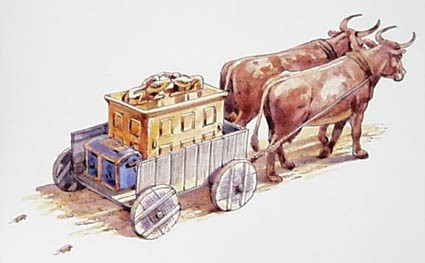
To listen to this reflection as a podcast, click here
The Bible brims with hope and encouragement.
But embedded within that Good News there are stories that do not make easy reading.
Such is the startling tale of the transporting of the ark of the covenant in 2 Samuel 6:1-15.
The word “ark” means chest or box. Two arks appear in the Bible. Noah’s ark was a gigantic box-like boat. The ark of the covenant, on the other hand, was a wooden box about four feet long, two feet high, and two feet wide. It was completely covered with gold, and was capped by a spectacular lid that featured a pair of carved gold cherubim, or angels.
The ark contained, among other things, a chiseled stone copy of the 10 Commandments. It represented God’s continuing presence with God’s people.
During one of the early chapters in the history of Israel, the ark has been captured by the Philistines and then marooned for about 30 years in the house of a Jewish priest named Abinadab. David, newly crowned as Israel’s king, figures the ark needs a more suitable resting place in Jerusalem. So he and an enthusiastic crowd decide to become the Returners of the Lost Ark.
Now Abinadab has two sons, Ahio and Uzzah. Apparently he and his wife had read that little booklet in the checkout line at the grocery: Distinctive Names For Your New Baby.
These two men assume the responsibility for transporting the ark. They place it on a new ox cart, with Ahio leading the way and Uzzah walking alongside as a kind of spotter. Unfortunately, the oxen stumble. The ark begins to slide. Uzzah extends his hand to keep it from hitting the ground. At the very moment he touches the ark, God strikes Uzzah dead.
This is a frightening scene. What kind of mean and capricious God would kill a man who is doing something so innocent – trying to keep the ark from splattering in the mud?
The answer is that God is not mean at all. As Dallas Willard points out, neither is electricity or nuclear power. But electricity, nuclear power, and God are all dangerous. And what Uzzah does with his hand is not as innocent as it looks.
We know nothing more about Uzzah than what we learn from the few lines of this story. Commentators speculate that he had taken upon himself a kind of professional responsibility for managing the ark. After all, for 30 years the ark has been in his house.
It may be that Uzzah has gradually gotten used to the presence of God. He has overlooked the fact that God had provided itemized safety precautions for transporting the ark. God had specifically told the Israelites that whenever the ark was to be moved, it should be carried. Priests should insert poles into the gold rings along its sides. They would then walk at a slow pace.
But here comes Uzzah, who, if anything, appears to be a practical man. Why not move the ark in a more technologically savvy fashion? Let’s put it on an ox cart. Not only that, it’s a Philistine SRX 360 ox cart, with Wi-Fi and automatic dealer upgrades. Uzzah may well have concluded that he had improved upon God’s instructions.
This is always a fatal decision.
If Uzzah had obeyed God’s instructions in the first place and used the poles, he would never have been in the position of having to touch the ark.
As theologian R.C. Sproul puts it, Uzzah makes the mistake of thinking, at the instant the ark is sliding off the cart, that his hand is more holy than God’s dirt. Bible scholars suggest that this isn’t just a mistake of the moment. It may be that Uzzah has gradually taken God’s presence for granted.
Many years ago I called upon a man who had been active at my church, but had gradually decided to stop coming. I asked if there was anything I had done to cause his discomfort.
There was a long pause. Then he told me something that was exceedingly hard to hear, and which I have never forgotten.
“Glenn, there have been moments in which it seems that you don’t take God very seriously in worship.” What did he mean by that, exactly? He went on, “Think about the last time you served me communion.” That morning we had invited our worshippers to come forward to receive the bread and the wine. As he walked to the spot where I was holding the cup, I remembered that he was on my list of things to do. I leaned forward and said, “Hey, that meeting on Tuesday night has been rescheduled.”
What was I doing? I was multi-tasking. I was being entirely practical. I was mediating the presence of God while getting a little administrative work done on the side.
But God will not be multi-tasked. I had lost my sense of wonder at being in the presence of a God who refuses to be taken for granted.
Eugene Peterson has written these wise words: “Worship is the strategy by which we interrupt our preoccupation with ourselves and attend to the presence of God. Worship is the time and place that we assign for deliberate attentiveness to God – not because he’s confined to time and place, but because our self-importance is so insidiously relentless that if we don’t deliberately interrupt ourselves regularly, we have no chance of attending to him at all in other times and in other places.”
Worship services, in other words, are for the express purpose of teaching us, in approximately one hour, how we should turn to God during every other hour of the week.
Uzzah’s story is not an easy read.
But it’s a living reminder that life must include moments in which we do nothing else but stop.
For the express purpose of being still and knowing that God is truly God.
